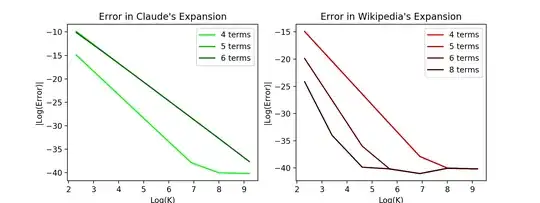Since $\sum_{i\ge 1}1/i^2$ converges, I wonder if there is any partial sum formula for it? Say $f(k)=\sum_{1\le i\le k} 1/i^2$ or $g(k)=\sum_{i\ge k} 1/i^2$ or at least an asymptotical one when $k$ is large enough?
2 Answers
One can come up with a decent asymptotic formula for $\sum_{i\geq k} 1/i^2$ by interpreting it as an approximation of the integral $\int_{k-1}^\infty 1/x^2 \,dx$.
Indeed, approximating the integral with the trapezoidal rule we have $$ \int_{k-1}^\infty \frac{1}{x^2}\,dx \approx \frac{1}{2(k-1)^2} + \sum_{i\geq k} \frac{1}{i^2}. $$ Before continuing let's analyze the error in the approximation. The right-hand side is the exact value of the integral of a piecewise linear approximation to $\frac{1}{x^2}$. The error in the linear approximation at a given point goes as $\frac{1}{x^4}$, and the integral of that goes as $k^{-3}$.
Now we can compute the exact value of the left hand side as $\frac{1}{k-1}$. Thus we arrive at the formula $$ \sum_{i\geq k}\frac{1}{i^2} = \frac{1}{k-1} - \frac{1}{2(k-1)^2} + O(k^{-3}). $$
In particular, using the fact that $\sum_{i=1}^\infty 1/i^2 = \pi^2/6$, we can also write $$ \sum_{i=1}^k\frac{1}{i^2} = \frac{\pi^2}{6} - \frac{1}{k} + \frac{1}{2k^2} + O(k^{-3}). $$
EDIT:
After some googling for higher-order terms, I found the following expansion for the sum based on the Euler-Maclaurin formula: $$ \sum_{i=1}^k \frac{1}{i^2} \approx \frac{\pi^2}{6} - \frac{1}{k} + \frac{1}{2k^2} - \frac{1}{6k^3} + \frac{1}{30k^5} - \frac{1}{42k^7}. $$
EDIT 2:
Since Claude's answer above has an expansion that disagrees with the one I found on Wikipedia, I thought I should numerically test which is correct. It turns out that Wikipedia's expansion is the correct one, as the following plots demonstrate:
I can provide the code that produced these plots if someone wants to double check.
- 3,790
-
Just out of curiosity : where did you find the last expansion ? – Claude Leibovici Aug 30 '17 at 05:36
-
I've updated the link to point to the formula (it's in the "Examples" section). I confess I didn't check it, so if it's wrong then perhaps the wikipedia page could use an edit. – felipeh Aug 30 '17 at 11:15
-
$+1$ for the edit and the comparison ! – Claude Leibovici Aug 30 '17 at 14:23
-
In fact the formula you used corresponds to Euler-Maclaurin Summation Formula while the one I used is just the Taylor expansion for infinitley large values of $k$. – Claude Leibovici Aug 31 '17 at 04:10
You could use the fact that $$S_k=\sum_{i=1}^k\frac{1}{i^2} =H_k^{(2)}$$ where appear the generalized harmonic numbers and, for large $k$ use the asymptotics $$S_k=\frac{\pi ^2}{6}-\frac{1}{k}+\frac{1}{2 k^2}-\frac{1}{6 k^3}+\frac{1}{2 k^4}-\frac{29}{30 k^5}+\frac{3}{2 k^6}+O\left(\frac{1}{k^7}\right)$$ For example, using $k=10$ (which is not large at all) the direct summation would give $\frac{1968329}{1270080}\approx 1.54977$ while the above expansion would lead to $\frac{\pi ^2}{6}-\frac{570749}{6000000}\approx 1.54981$.
Concerning the second one, we can write $$\sum_{i=k+1}^n\frac{1}{i^2}=\sum_{i=1}^n\frac{1}{i^2}-\sum_{i=1}^k\frac{1}{i^2}=S_n-S_k$$ and reuse the above expansion. For example, using $k=10$ and $n=20$, the direct summation would give $\frac{100571322842761}{2167695039654144}\approx 0.0463955$ while using twice the above expansion would lead to $\frac{17801029}{384000000}\approx 0.0463568$.
Edit
For sure, as felipeh did in his/her answer, it would be better to use Euler-Maclaurin Summation Formula (see here) (rather than the Taylor expansion I used); this write $$\sum_{i=1}^k\frac1{i^2}=\frac{\pi ^2}{6}-\frac1k+\frac1{2k^2}-\frac1{6k^3}+\frac1{30k^5}-\frac1{42k^7}+\frac1{30k^9}-\frac5{66k^{11}}$$ which, for the worked examples given above, would give almost exact values.
- 260,315
-
I ran some numerical tests to see which of our expansions is correct and it seems that Wikipedia's is more accurate. I just wanted to know if I should correct Wikipedia, didn't mean to put you on the spot. – felipeh Aug 30 '17 at 14:18
-
I shall restart the work tomorrow morning and I shall let you know. I do not see where I have done some mistake. In any manner, thanks for pointing out the problem. Cheers. – Claude Leibovici Aug 30 '17 at 14:21
